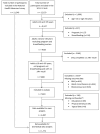Plant-Based Diet Quality Is Associated with Cardiometabolic Health in Adults: A Cross-Sectional Analysis of the Australian Health Survey
- PMID: 40431362
- PMCID: PMC12113780
- DOI: 10.3390/nu17101621
Plant-Based Diet Quality Is Associated with Cardiometabolic Health in Adults: A Cross-Sectional Analysis of the Australian Health Survey
Abstract
Background/Objectives: Evidence suggests that plant-based dietary patterns are beneficial for cardiometabolic health. However, it is unclear whether the quality of plant-based dietary patterns is differentially associated with cardiometabolic health. This study aimed to examine the association between three plant-based diet quality indices and cardiometabolic health among Australian adults. Methods: Data on 4877 adults (mean 45.1 years) from the cross-sectional Australian Health Survey 2011-2013 were used. Three plant-based diet quality indices (overall, healthful, and unhealthful) were derived from two 24 h dietary recalls. Anthropometric measures and blood pressure were assessed by trained interviewers. High-risk waist circumference was classified as ≥80 cm in females and ≥80 cm in males. Hypertension was defined as >140/90 mmHg. Fasting blood samples were used to estimate lipid profiles and diabetes status (based on plasma glucose or HbA1c). Multivariate logistic regression analyses were used to investigate the association between plant-based diet indices and cardiometabolic markers. Results: The healthy plant-based diet index was associated with lower odds of a high-risk waist circumference (OR 0.98; 95%CI 0.96-0.99), and the unhealthy plant-based diet index was associated with increased odds of having hypertension (OR 1.02; 95%CI 1.00-1.04). No other significant associations were identified between the plant-based diet quality indices and cardiometabolic outcomes. Conclusions: There was some evidence that the quality of plant-based dietary patterns was differentially associated with cardiometabolic health, with healthier plant-based dietary patterns associated with lower odds of a high-risk waist circumference, and less healthy plant-based dietary patterns associated with increased odds of hypertension. These findings support the consideration of the quality of plant foods consumed, and the need for targeted advice for optimising cardiometabolic health among adults.
Keywords: adults; blood pressure; cardiometabolic health; obesity; plant-based diet quality.
Conflict of interest statement
The authors declare no conflicts of interest.
Figures
Similar articles
-
Trajectories of plant-based dietary patterns and their sex-specific associations with cardiometabolic health among young Australian adults.Int J Behav Nutr Phys Act. 2025 May 27;22(1):62. doi: 10.1186/s12966-025-01765-0. Int J Behav Nutr Phys Act. 2025. PMID: 40426187 Free PMC article.
-
Association between diet quality, dietary patterns and cardiometabolic health in Australian adults: a cross-sectional study.Nutr J. 2018 Feb 12;17(1):19. doi: 10.1186/s12937-018-0326-1. Nutr J. 2018. PMID: 29433574 Free PMC article.
-
Association between plant-based diet quality and chronic kidney disease in Australian adults.Public Health Nutr. 2024 May 17;27(1):e142. doi: 10.1017/S1368980024001095. Public Health Nutr. 2024. PMID: 38757167 Free PMC article.
-
The emergence of cardiometabolic disease risk in Chinese children and adults: consequences of changes in diet, physical activity and obesity.Obes Rev. 2014 Jan;15 Suppl 1(0 1):49-59. doi: 10.1111/obr.12123. Obes Rev. 2014. PMID: 24341758 Free PMC article. Review.
-
Behavioral Counseling to Promote a Healthful Diet and Physical Activity for Cardiovascular Disease Prevention in Adults Without Known Cardiovascular Disease Risk Factors: Updated Systematic Review for the U.S. Preventive Services Task Force [Internet].Rockville (MD): Agency for Healthcare Research and Quality (US); 2017 Jul. Report No.: 15-05222-EF-1. Rockville (MD): Agency for Healthcare Research and Quality (US); 2017 Jul. Report No.: 15-05222-EF-1. PMID: 29364620 Free Books & Documents. Review.
References
-
- Afshin A., Sur P.J., Fay K.A., Cornaby L., Ferrara G., Salama J.S., Mullany E.C., Abate K.H., Abbafati C., Abebe Z., et al. Health effects of dietary risks in 195 countries, 1990–2017: A systematic analysis for the Global Burden of Disease Study 2017. Lancet. 2019;393:1958–1972. doi: 10.1016/S0140-6736(19)30041-8. - DOI - PMC - PubMed
-
- Moreno S.V., Uddin R., McNaughton S.A., Livingstone K.M., George E.S., Siopis G., Maddison R., Huxley R.R., Islam S.M.S. The burden of cardiovascular disease attributable to dietary risk factors in Australia between 1990 and 2019. PLoS ONE. 2024;19:e0295231. doi: 10.1371/journal.pone.0295231. - DOI - PMC - PubMed
-
- Lichtenstein A.H., Appel L.J., Vadiveloo M., Hu F.B., Kris-Etherton P.M., Rebholz C.M., Sacks F.M., Thorndike A.N., Horn L.V., Wylie-Rosett J. 2021 dietary guidance to improve cardiovascular health: A scientific statement from the American heart association. Circulation. 2021;144:e472–e487. doi: 10.1161/CIR.0000000000001031. - DOI - PubMed
-
- Olstad D.L., Leech R.M., Livingstone K.M., Ball K., Thomas B., Potter J., Cleanthous X., Reynolds R., McNaughton S.A. Are dietary inequalities among Australian adults changing? A nationally representative analysis of dietary change according to socioeconomic position between 1995 and 2011–13. Int. J. Behav. Nutr. Phys. Act. 2018;15:30. doi: 10.1186/s12966-018-0666-4. - DOI - PMC - PubMed
MeSH terms
Substances
LinkOut - more resources
Full Text Sources
Medical


